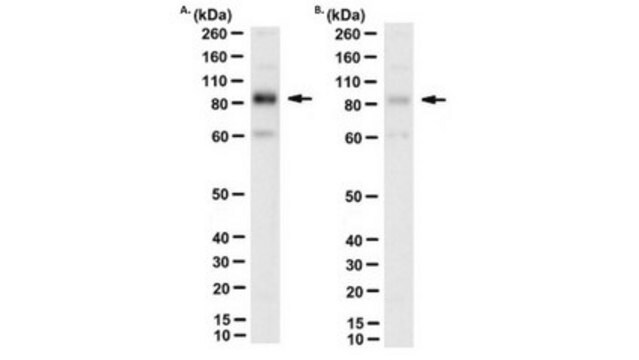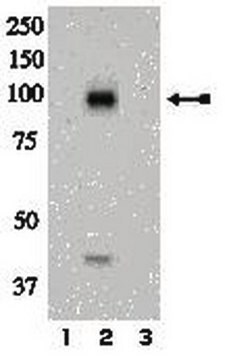MABN2425
Anti-TRPV2 Antibody, clone 17A11
clone 17A11, from mouse
Synonyme(s) :
Transient receptor potential cation channel subfamily V member 2, Osm-9-like TRP channel 2, OTRPC2, Stretch-activated channel 2B, Vanilloid receptor-like protein 1, VRL-1
About This Item
Produits recommandés
Source biologique
mouse
Forme d'anticorps
purified immunoglobulin
Type de produit anticorps
primary antibodies
Clone
17A11, monoclonal
Espèces réactives
mouse, rat
Conditionnement
antibody small pack of 25 μg
Technique(s)
immunocytochemistry: suitable
western blot: suitable
Isotype
IgG1κ
Numéro d'accès NCBI
Numéro d'accès UniProt
Modification post-traductionnelle de la cible
unmodified
Informations sur le gène
mouse ... Trpv2(22368)
rat ... Trpv2(29465)
Description générale
Spécificité
Immunogène
Application
Immunocytochemistry Analysis: A representative lot detected TRPV2 in Immunocytochemistry applications (Cohen, M.R., et. al. (2013). PLoS One. 8(12):e85392; Cohen M.R., et. al. (2015). Mol Cell Biol. 35(24):4238-52).
Qualité
Immunocytochemistry Analysis: 2-10 µg/mL of this antibody detected TRPV2 in PC12 cells treated with mouse NGF.
Description de la cible
Forme physique
Autres remarques
Vous ne trouvez pas le bon produit ?
Essayez notre Outil de sélection de produits.
Certificats d'analyse (COA)
Recherchez un Certificats d'analyse (COA) en saisissant le numéro de lot du produit. Les numéros de lot figurent sur l'étiquette du produit après les mots "Lot" ou "Batch".
Déjà en possession de ce produit ?
Retrouvez la documentation relative aux produits que vous avez récemment achetés dans la Bibliothèque de documents.
Notre équipe de scientifiques dispose d'une expérience dans tous les secteurs de la recherche, notamment en sciences de la vie, science des matériaux, synthèse chimique, chromatographie, analyse et dans de nombreux autres domaines..
Contacter notre Service technique








